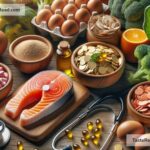The Role of Vitamin B12 in Metabolic Health
Vitamin B12 is one of the most important nutrients your body needs to stay healthy. While many people have heard of this vitamin, not everyone understands what it does or why it plays such a big role in your body’s ability to function properly. In this article, we’ll explain in simple terms what Vitamin B12 is, why it’s crucial for metabolic health, and how you can make sure you’re getting enough of it.
What Is Vitamin B12?
Vitamin B12, also known as cobalamin, is a nutrient that belongs to the family of B vitamins. It helps your body convert food into energy and plays a key part in several vital processes, including red blood cell production, brain function, and DNA creation. Unlike some other vitamins, your body doesn’t produce Vitamin B12 on its own. Instead, you have to get it from food sources or supplements.
This vitamin is water-soluble, which means it dissolves in water and travels through your bloodstream. While your body does store a small amount of B12 in your liver, it’s important to regularly consume it to meet your daily needs.
What Is Metabolism, and Why Does It Matter?
Before we dive into Vitamin B12’s role, let’s quickly talk about metabolism. Metabolism refers to all the chemical processes in your body that keep you alive and functioning, such as breathing, digesting food, repairing cells, and maintaining energy levels. Think of metabolism as the engine of your body—it converts the food you eat into fuel so you can move, think, and perform all of your everyday tasks.
When your metabolism isn’t functioning well, you might experience symptoms like fatigue, difficulty concentrating, or unexpected weight changes. This is where Vitamin B12 comes in to help!
How Does Vitamin B12 Support Metabolic Health?
Vitamin B12 is a key player in metabolic health because it directly influences how your body produces energy. Here are three important ways this vitamin helps:
1. Energy Production
Vitamin B12 helps convert the carbohydrates, fats, and proteins you eat into usable energy. Without enough B12, your body may struggle to break down food properly, leaving you feeling tired and sluggish.
2. Red Blood Cell Formation
Red blood cells transport oxygen throughout your body, and Vitamin B12 is essential for making them. If you don’t have enough B12, your body can’t produce healthy red blood cells, which can lead to a condition called anemia. Anemia reduces oxygen flow to your tissues, making you feel weak and low on energy.
3. Nervous System Support
Your brain and nerves also rely on Vitamin B12 to function properly. It helps maintain the protective covering around your nerves, known as myelin, which allows signals to travel efficiently between your brain and other parts of your body. A lack of B12 can lead to nerve damage, tingling sensations, or difficulty concentrating.
What Happens When You Don’t Get Enough Vitamin B12?
Vitamin B12 deficiency can cause serious problems for your metabolic health and overall well-being. Common symptoms include fatigue, weakness, memory problems, numbness or tingling in your hands and feet, and difficulty maintaining balance. In severe cases, it can lead to more serious issues like anemia, nerve damage, or even neurological disorders.
Older adults, vegetarians, vegans, and people with certain medical conditions (like gastrointestinal disorders or those who have had weight-loss surgeries) are at higher risk of B12 deficiency. This is because their bodies may have trouble absorbing the vitamin from food.
How Can You Get Enough Vitamin B12?
There are two main ways to get Vitamin B12: through your diet or through supplements. Let’s look at both:
1. Dietary Sources
Vitamin B12 is naturally found in animal-based foods. Some of the best sources include:
– Meat: Beef, chicken, and liver are rich in B12.
– Fish and Shellfish: Salmon, trout, tuna, and clams are excellent options.
– Dairy Products: Milk, yogurt, and cheese contain B12.
– Eggs: Another good option for those who eat animal-derived products.
For vegetarians and vegans, getting enough B12 can be more challenging since it isn’t naturally found in plant-based foods. Some vegan-friendly options include fortified foods like breakfast cereals, plant-based milk, and nutritional yeast.
2. Supplements
If your diet doesn’t provide enough B12 or if your body has trouble absorbing it, you can take supplements. B12 is available in several forms, including tablets, capsules, and injections. A healthcare provider can help you decide which option is best based on your specific needs.
How Much Vitamin B12 Do You Need?
The recommended daily amount (RDA) of Vitamin B12 for most adults is about 2.4 micrograms. Pregnant or breastfeeding women may need slightly more. Always talk to your doctor before making changes to your diet or taking supplements.
Conclusion
Vitamin B12 is vital for maintaining your metabolic health and energy levels. It helps your body produce energy, create red blood cells, and keep your brain and nervous system working smoothly. If you don’t get enough B12, you may experience fatigue, weakness, or other health problems that can interfere with your day-to-day life.
The good news is that there are plenty of ways to keep your B12 levels in check, whether through a balanced diet or supplements. By incorporating foods rich in B12 or speaking with your doctor about supplementation, you can support your metabolism and enjoy better health overall.
Remember, your body works hard every day to keep you healthy—and Vitamin B12 plays a crucial role in that process!


